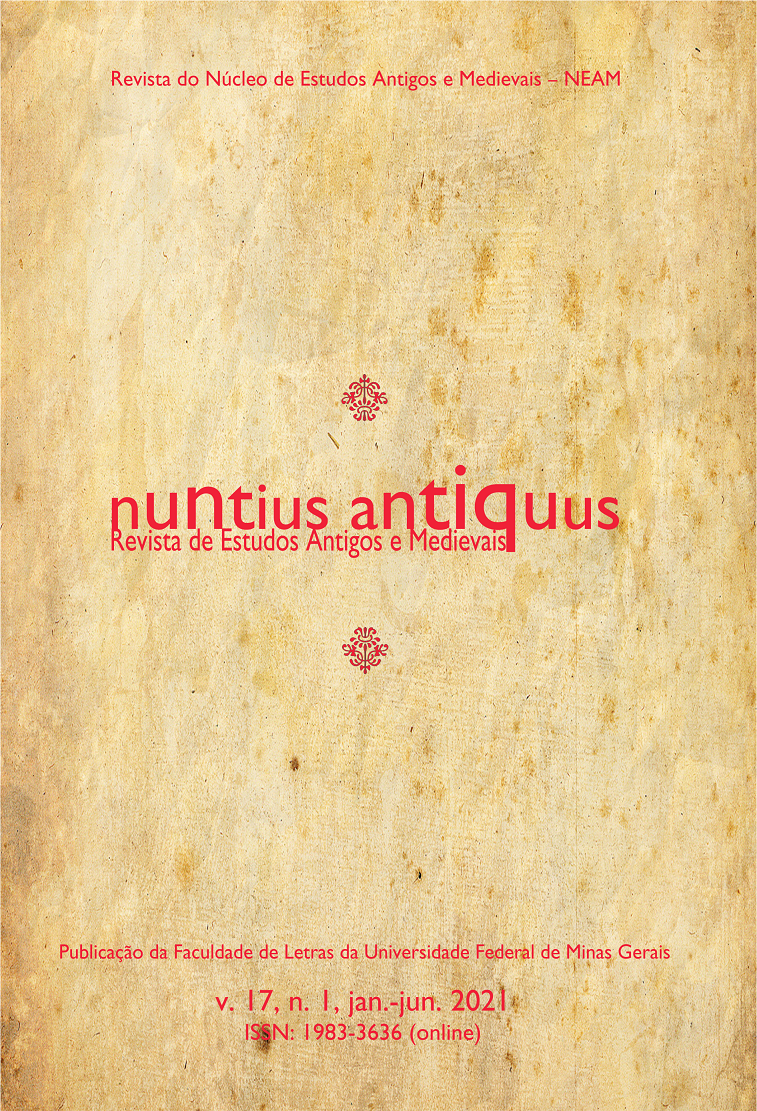How Did Substantive Clauses Appear in Latin?
An Analysis on Durham’s Study from Other Perspectives
Keywords:
Latin language, Plautus, syntax, pragmatics, historical linguisticsAbstract
This paper aims at reviewing the methodology used by Durham (1901) to describe the origin of subjunctive subordinate clauses, based on the language of Plautus. He collected Plautine tokens he believed to be comparable to those originally used in a supposed paratactic stage of Latin, from which subordination would have developed. His poorly detailed methodology was then further explained and specified, with linguistic theories not available at his time, namely the concept of enunciation, speech acts and pragmatics in general. The conclusion was that some conditions of ‘harmony’ between two paratactic verbs must be fulfilled so that Durham’s procedure can be adopted, to explain how two paratactic verbs can be reanalysed as hypotactic. The paper follows with some criticism over the assumption of a paratactic stage of Latin, which is fundamental to his theory. At last, a very brief exposition is made about another possible approach to his collected data, a synchronic, quantitative and distributional approach.
Downloads
References
ALLEN, J. H.; GREENOUGH, J. B. New Latin Grammar. Boston; London: Ginn & Company, 1903.
ANTOINE, F. De la parataxe et de l’hypotaxe dans la langue latine. Revue des Études Anciennes, Bordeaux, v. 1, n. 1, p. 27-46, 1899. DOI: https://doi.org/10.3406/rea.1899.1124.
BALDI, P. The Foundations of Latin. Berlin: Mouton de Gruyter, 2002. DOI: https://doi.org/10.1515/9783110807110.
BENNETT, C. E. Syntax of Early Latin. Hildesheim: Georg Olms, 1982 [1910-1914]. v. 2. em 1.
BENVENISTE, É. L’appareil formel de l‘énonciation. In: BENVENISTE, É. Problèmes de linguistique générale, 2. [S. l.]: Gallimard, 2014. p. 79-90.
BRUGMANN, K. Grundriss der vergleichenden Grammatik der indogermanischen Sprachen. Einleitung und Leutlehre. Wortbildungslehre. Strassburg: Karl J. Trübner, 1886-1892. v. 2.
BUCK, C. D. A Grammar of Oscan and Umbrian. Boston: The Athenaeum Press, 1904.
CART, A. et al. Grammaire Latine. [S. l.]: Nathan, 2007 [1955].
CLACKSON, J.; HORROCKS, G. The Blackwell History of the Latin Language. Malden, MA; Oxford: Wiley-Blackwell, 2011 [2007].
DE VAAN, M. Etymological Dictionary of Latin and the Other Italic Languages. Leiden; Boston: Brill, 2008. (Leiden Indo-European Etymological Dictionary Series, v. 7).
DELBRÜCK, B. Vergleichende Syntax der indogermanischen Sprachen. Strassburg: Karl J. Trübner, 1893-1900. 3 v. (Grundriss der vergleichenden Grammatik der indogermanischen Sprachen). DOI: https://doi.org/10.1515/9783111600550.
DICKEY, E. The Rules of Politeness and Latin Request Formulae. In: PROBERT, P.; WILLI, A. (ed.). Laws and Rules in Indo European. Oxford: Oxford University Press, 2012. p. 313-328. DOI: https://doi.org/10.1093/acprof: oso/9780199609925.003.0017.
DURHAM, C. L. The Subjunctive Substantive Clauses in Plautus, not Including Indirect Questions. Ithaca, NY: Cornell University Press, 1901. (Cornell Studies In Classical Philology, v. 13). Disponível em: http://hdl.handle.net/2027/
mdp.39015035972697. Acesso em: 1 out. 2020.
ERNOUT, A.; MEILLET, A. Dictionnaire Étymologique de la Langue Latine. Histoire des mots. Paris: Klincksieck, 2001.
FORTSON, B. W. Indo-European Language and Culture: An Introduction. 2. ed. Malden; Oxford: Blackwell, 2010.
HOFMANN, J. B.; SZANTYR, A. Lateinische Syntax und Stilistik. München: C. Beck, 1965.
LIMA, R. Gramática Normativa da Língua Portuguesa. Rio de Janeiro: José Olympio, 2014.
LINDSKOG, C. Quaestiones de parataxi et hypotaxi apud priscos latinos. Lundae: Möller, 1896.
MAZZANTI JR., A. With or without ut? Full Evidence of Subjunctive Complementation of facio in Archaic Latin. Transactions of the Philological Society, v. 118, n. 1, p. 79-93, 2020. DOI: https://doi.org/10.1111/1467-968X.12167.
MORPURGO DAVIES, A. Karl Brugmann and Late Nineteenth-Century Linguistics. In: BYNON, T.; PALMER, F. R. (ed.). Studies in the History of Western Linguistics. In Honour of R. H. Robins. Cambridge: Cambridge University Press, 1986. Disponível em: http://www.ling-phil.ox.ac.uk/files/amd_brugmann_and_late_19th_c._linguistics_1986.pdf. Acesso em: 1 out. 2020.
PINKSTER, H. Oxford Latin Syntax. Volume 1: The simple clause. Oxford: Oxford University Press, 2015. DOI: https://doi.org/10.1093/acprof:oso/9780199283613.001.0001.
POKORNY, J. Indogermanisches Etymologisches Wörterbuch. Bern; München: Francke Verlag, 1959.
RISSELADA, R. Imperatives and Others Directives Expressions in Latin: A Study in the Pragmatics of a Dead Language. Amsterdam: Gieben, 1993. DOI: https://doi.org/10.1163/9789004408975.
SCHMIDT, J. Die griechischen ortsadverbia auf -υι, -υις und der interrogativstamm ku. Zeitschrift für vergleichende Sprachforschung auf dem Gebiete der Indogermanischen Sprachen, Cambridge, v. 32, p. 394-415, 1893.
SEARLE, J. R. Classification of Illocutionary Acts. Language in Society,Cambridge, v. 5, n. 1, p. 1-23, 1976. DOI: https://doi.org/10.1017/S0047404500006837. USSING, J. L. T. Macci Plauti Comoediae. Volumen primum. Amphitruonem et Asinariam cum prolegomenis et commentariis continens. Hauniae: Sumptibus Librariae Gyldendalianae, 1875.
WEISS, M. Outline of the Historical and Comparative Grammar of Latin. Ann Arbor; New York: Beech Stave Press, 2009.





